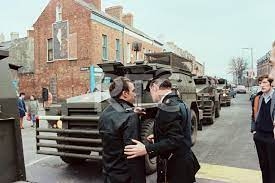Report finds 'collusive behaviours' by RUC officers over Belfast murders

A Police Ombudsman for Northern Ireland police inquiry has found significant investigative and intelligence failings and "collusive behaviours" by Royal Ulster Constabulary (RUC) officers linked to a series of loyalist murders in Belfast in the 1990s. The report investigated nine attacks by the Ulster Defence Association (UDA) a proscribed terrorist group, in which 11 people were murdered. The report also found evidence that eight UDA members had been working as informants and that between them they had been linked by intelligence to 27 murders or attempted murders.
Using the cover name Ulster Freedom Fighters (UFF) the UDA/UFF were responsible for more than 400 deaths, the majority of its victims being Irish Catholic civilians, murdered at random. The Police Ombudsman for Northern Ireland, Marie Anderson said she had been "deeply concerned" by the scale of the failings identified during the investigation. Amongst other areas of concern was the "continued, unjustifiable use by British Special Branch of informants involved in serious criminality, including murder, and the passive 'turning of a blind eye' to such activities".
Marie Anderson said that "I am of the view that the absence of controls, combined with the absence of records relating to these informants, constitutes collusive behaviour." The Royal Ulster Constabulary (RUC) was the militarised police force in Northern Ireland from 1922 to 2001. Its membership was overwhelmingly Protestant and heavily criticised by sections of the Catholic and nationalist community for one-sided policing and sectarianism when enforcing British rule in the north-east of Ireland.
The RUC was reformed and renamed on the 4th November 2001 after an Independent Commission on Policing for Northern Ireland (the Patten Commission) was set up, and the RUC was replaced by the Police Service of Northern Ireland (PSNI). In a statement in response to the latest investigation finding the PSNI said areas of the report made for "uncomfortable reading". Temporary Assistant Chief Constable Jonathan Roberts stated "we will never seek to excuse bad policing and where criticism is reasonably made the Police Service will acknowledge and address that. He added that much had changed in the intervening 30 years, including a restructuring of intelligence handling.
Image: Courtesy of Raidió Teilifís Éireann - A convoy of RUC (Royal Ulster Constabulary) armoured cars, on a Belfast street in December 1982.





